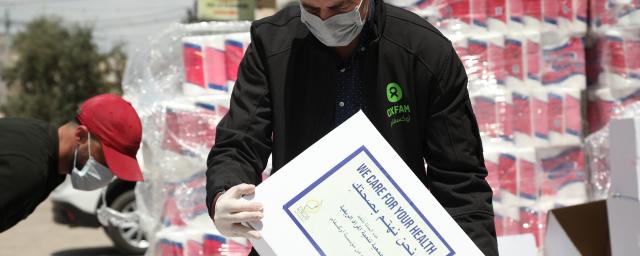
When COVID-19 started to spread in the West Bank, Occupied Palestinian Territory, Oxfam and its local partners distributed hygiene kits to families who couldn’t afford such materials. Photo: Suhaib Jarrar/Oxfam
March 11, 2020. The World Health Organisation declared Covid-19 a pandemic.
A year on. The disease has infected over 100 million and killed over 2 million. Its economic and social fallout will be felt for decades. It affected us all in different and unpredictable ways.
Covid-19 has magnified what it is to live in poverty and with discrimination, as it has to live in security and privilege. Covid-19 also brought the best in us, with stories of solidarity, bravery and resilience.
Covid-19 hit Oxfam too. We had to change the scope and scale of our work. We had to adapt to cope to Covid-19 and the costs it demanded. But because of the belief and goodwill of our amazing supporters and partners we emerge having helped 14 million people around the world through Coronavirus Year 1.
We are proud to invite you at this snapshot of the past year of Oxfam’s work with our staff and partners around the world.
March 2020
Oxfam tackles the virus as a public health, humanitarian, economic and gender injustice “meta-crisis”. We understand it will hit the poorest and marginalized among us first and worst.
Building on decades of humanitarian experience in epidemics and hunger crises and fighting inequality, we release “How to Confront the Coronavirus Catastrophe” including calling for a free and effective vaccine for everyone everywhere, and massive new investments by governments into health systems.

Trust Mugwagwa, Oxfam public health engineer, assisting local volunteers to distribute water in Harare suburbs, Zimbabwe, where the coronavirus outbreak is adding a crisis on top of a crisis. Only 49 per cent of water points are fully functional in the country. Photo: Tavonga Chikwaya/Oxfam
Public health experts recommend social distancing, frequent handwashing and mask wearing, so we mobilize in 56 countries to provide water, sanitation, hygiene support and community outreach to the most vulnerable people.
April 2020
The pandemic reaches a million confirmed cases. It is also exploiting the worst aspects of extreme inequality. In “Dignity Not Destitution”, we say it could push 500 million more people into poverty, setting back the struggle against poverty by 30 years in sub-Saharan Africa and Middle East, with Africa alone in danger of losing half its jobs. Women are shouldering most of the burden.
We lay out an “economic rescue plan for all” that includes $2.5 trillion in financing from debt relief, aid and the release of global reserves, noting there are only three ventilators in the entire Central African Republic.
COVID-19 demonstrates that essential workers have very little protection. They are domestic helpers, street vendors, daily wage labourers, and many of them fall outside of any social protections. Lockdowns have left them with little recourse.

Shahida, a 25-year-old unemployed domestic worker living in Dhaka, stands in line with her eight-month-old son at a food distribution carried out by Oxfam partner Nari Maitree. Due to lack of employment during the Covid crisis, women face acute food shortages. Photo: Fabeha Monir/Oxfam
May 2020
The first cases of COVID-19 in the Rohingya refugee camps, the largest in the world. With our partners, we use what we learned from working in disease outbreaks with refugees as front-liners to help people in local communities to manage the risks to themselves.

Oxfam volunteer Zahid Hossain is talking to Abdul Malek* (80) about precaution elderly has to take during Covid19 outbreak in a Rohingya refugee camp in Cox's Bazar, Bangladesh. Photo: Fabeha Monir/Oxfam
We throw our weight into the People’s Vaccine campaign calling on all pharmaceutical corporations working on COVID-19 to openly share their technology and intellectual property, so that safe and effective vaccines can be available to all.
With UNAIDS we coordinate a public letter by 140 world leaders. We reveal that vaccinating the poorest half of humanity – 3.7 billion people – will cost less than what the ten biggest pharmaceutical companies make in four months.

Even as COVID-19 took all of our attention, 2020 was not without other crises. Oxfam staff member Ali works to prepare one of the Rohingya refugee camps in Cox's Bazar before the powerful Cyclone Amphan. Photo: Fabeha Monir/Oxfam
June 2020
Isolation deepens and people see less of their families and friends. Oxfam loses the face-to-face connections we have with our supporters and volunteers. Oxfam shops worldwide are shut down. To stay connected, we call up our supporters just to check in and ask them how they are.
Our staff and partners step up in frontline support to provide services that people badly need. The flow of water, food, livelihood support, information, and other services that women and girls need has to continue. That doesn’t mean the frontliners are less afraid or at risk.
July 2020
The hunger crisis deepens. We sound the alarm “The hunger virus: how COVID-19 is fueling hunger in a hungry world”, predicting that up to 12,000 people could die each day by the end of the year from hunger linked to COVID-19 as 121 million people are pushed to brink of starvation.
We mobilize with partners, supporting people with food assistance, cash, livelihoods support, while advocating for enhanced social protections.
We expose the “Pandemic Profiteers”: 17 of the top 25 most profitable US corporations, including Microsoft, Johnson & Johnson, Facebook, Pfizer and Visa, are expected to make almost $85 billion more in 2020 than in previous years.
August 2020
Across 30 countries Oxfam’s Protection Monitoring finds worrying trends. People who are politically marginalized, ethnic minorities, refugees, migrants, internally displaced, LGBTQ+, and women are disproportionately facing increased discrimination and violence.

As part of the response to Venezuelan migration in northern Colombia, Oxfam works hand in hand with Fundación Mujer y Futuro to implement safe spaces for migrant women and girls. We set up temporary shelters and distribute food and hygiene kits. Photo: Mario Niño/Oxfam.
We reveal the alarming death rate among 800 indigenous peoples – a nine-fold increase in the Amazon, twice as high as others – and call for action to avert ethnocide. Far from hospitals and the news cameras, 45 million lives are at serious risk as the pandemic worsens the inequalities and social exclusion of indigenous people.
September 2020
Second and third peaks of COVID-19 mean we have to become more creative and connected to our communities, even as the pandemic keeps us physically apart - from refugee-designed handwashing stations to the creation of a COVID-19 hotline with our Somalian partner Shaqodoon.
We lay bare the “Inequality Virus”: 32 of the world’s largest companies stand to see their profits jump by $109 billion in 2020. The 25 richest billionaires increase their wealth by so much that Jeff Bezos could personally pay each of Amazon’s 876,000 employees a one-time $105,000 bonus and still be as wealthy as he was at the beginning of the pandemic.

Sumarni, 67, is a soft drink peddler in Central Jakarta, Indonesia. She says she has no choice but to keep working outside while most people told to stay at home. “Only the rich could stay at home,” Sumarni says. “This job is all I know. This is how I feed my family.” Photo: Adi Renaldi/Oxfam
October 2020
COVID-19 highlights the fragility of our food system. Food workers in the global supply chains are on the frontline of the coronavirus, producing, picking and packing the food that fills our supermarkets shelves.
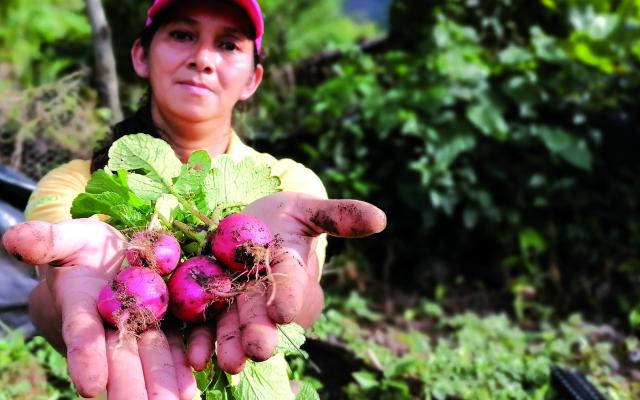
Orbelina García lives in the Central American Dry Corridor. She was part of the ‘Field School’ project carried out by Oxfam and its partners, where she learned cultivation and care techniques to develop her own gardens. In times of pandemic, this allowed Orbelina to have food on hand for her subsistence and that of her family. Photo: Alfredo Carias/Oxfam
We publish the Commitment to Reducing Inequality Index (CRII) revealing the majority of the world’s countries were woefully ill-equipped to deal with COVID-19. Only 26 out of 158 countries were spending enough on health prior to the pandemic and, in 103 countries, at least one in three workers lacked basic labour rights and protections, like sick pay, when the virus struck.
November 2020
Many governments are spending more repaying debt than on health. Even before COVID-19 hit, there was a shortage of 17.4 million health workers worldwide. We help 1,000 healthcare experts urging the G20 to cancel the debt so that countries can invest in more resilient healthcare systems instead.
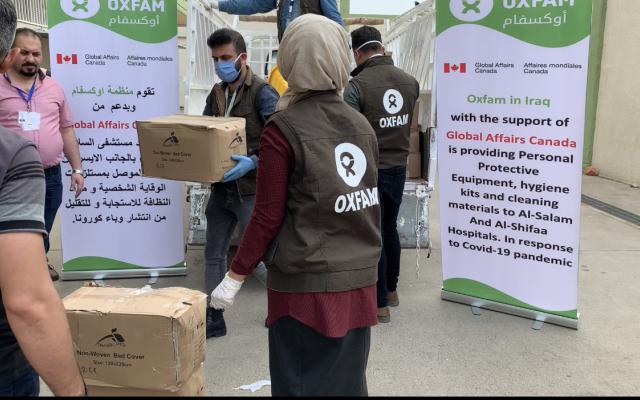
Oxfam in Iraq is providing supporting protective equipments and hygiene kits to the Al-Salam and Al-Shifa hospitals - which include isolation and treatment centres - and rehabilitating the water and sanitation facilities. Photo: Oxfam in Iraq
We begin to deliver humanitarian aid in Nicaragua, Honduras and Guatemala to help those affected by Hurricane Eta, the most devastating to hit Central America since 1998. The disaster hits hardest the women and girls who already have an immense workload due to a food crisis made worse by drought and the effects of COVID-19.
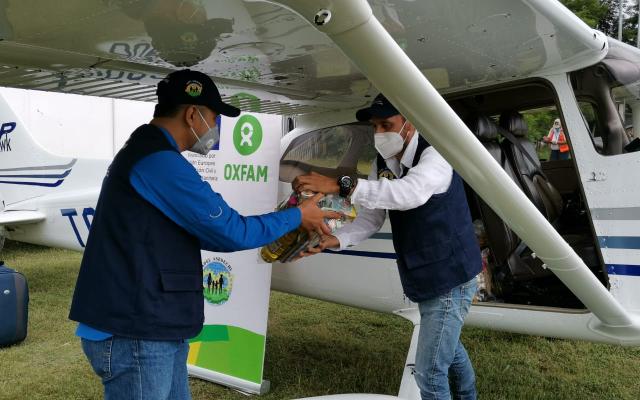
Some communities in Guatemala are cut off by the floods and landslides. In order to get there, we are making humanitarian flights with enough food and water for 8 days for the most affected families. Photo: Asede/Esfra/Ismugua
December 2020
With other campaigning organizations, we warn that only one in ten people across nearly 70 poor countries will get vaccinated next year unless governments and the pharmaceutical industry make sure more doses are produced. By the end of this month, wealthier nations have bought up enough doses to vaccinate their entire populations nearly three times over.
We put out new research showing that over a third of the world’s population has had no public money to cope with the effects of the pandemic. “Shelter from the Storm” finds that none of the 126 low and middle-income countries we reviewed has invested enough into disability, unemployment, child, and elderly benefits to meet everyone’s needs.
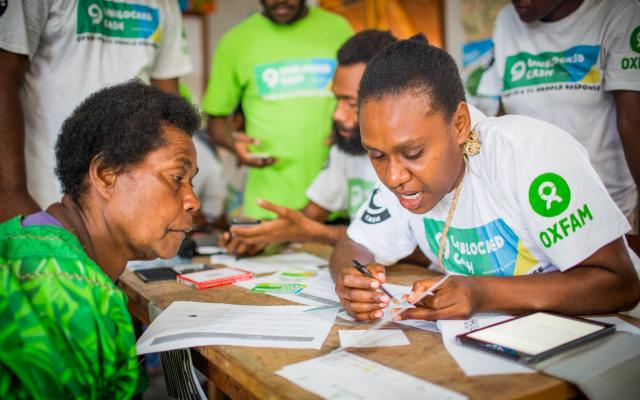
A year after its ground-breaking pilot, Oxfam in Vanuatu, together with 17 local and international partners, is scaling its blockchain-based UnBlocked Cash project to distribute cash and voucher assistance to over 35,000 beneficiaries affected by the Category 5 Cyclone Harold and COVID-19. Photo: Arlene Bax/Oxfam
January 2021
At the World Economic Forum in Davos, Oxfam lays out before international media that COVID-19 could increase economic inequality in almost every country at once - the first time since records began a century ago.
We show that the 1,000 richest people on the planet recovered their COVID-19 losses within just nine months, while it will take more than a decade for the world’s poorest to do so. The world’s ten richest men increased their combined wealth increase by half a trillion dollars since the pandemic began — more than enough to pay for a COVID-19 vaccine for everyone in the world.
February 2021
Young people have been hit so hard and more than half of all children off school. We show how in a region like West Africa, with the youngest population in the world, youth are an asset and deserve our support. Oxfam is working with "Les Africtivistes" to map 100 youth initiatives to fight COVID-19.
Covid-19 does not spare countries at war. In Yemen, widespread destruction of health and water services have left people there acutely vulnerable to the virus. Nearly two out of every five families are buying food and medicines by going into debt. Over 5 million Yemenis risk losing access to food and clean water as the virus spreads.
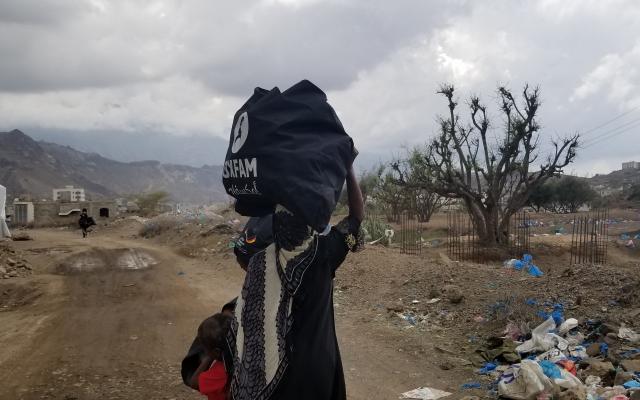
In Yemen, we provide cash to displaced families, distribute hygiene kits and truck in clean water to camps for people who have fled their homes. We train volunteers to raise awareness of the virus and promote hygiene amongst conflict-affected communities. Photo: Wael Algadi/Oxfam
March 2021
Our fears that Covid-19 could create a backlash against gender equality in many countries and tear away the gains of the past are being realized. Many more women and girls are now living in poverty and hunger and hit by a surge of gender-based violence. The pandemic has also intensified care work, even more disproportionately toward women who are simultaneously teacher, caregiver, family health worker.
Out of the 14.3 million people Oxfam has reached since the start of the pandemic, 54% have been women and girls. We focus on gender in the 68 countries we work in. In 24 countries we support women’s rights organizations to advance women and girls’ rights.
Our impact in numbers
14 million people reached
We partnered with 694 civil society organizations in 68 countries, including 33 dedicated to women’s rights. We also joined with more than 200 women’s rights organizations in advocating for gender equality in Covid.
WATER AND SANITATION
More than 9.5 million people were provided with water, sanitation and hygiene support.
FOOD AND JOBS
Over 1.6 million people were provided with food security and livelihoods support.
CASH
Over 1 million people were supported with cash for basic needs.
GENDER AND PROTECTION
More than 550,000 people were supported in gender and protection services.
A time of extraordinary solidarity
Inequality is at an all-time high. But one year on, Oxfam has also felt an extraordinary solidarity, bravery and diversity of action with our supporters, partners, volunteers, and staff. The pandemic sparked new ways for us to stand shoulder-to-shoulder with our partners in support of the communities we work with, and bring our supporters along with us.
Please support our work and help us do more.

